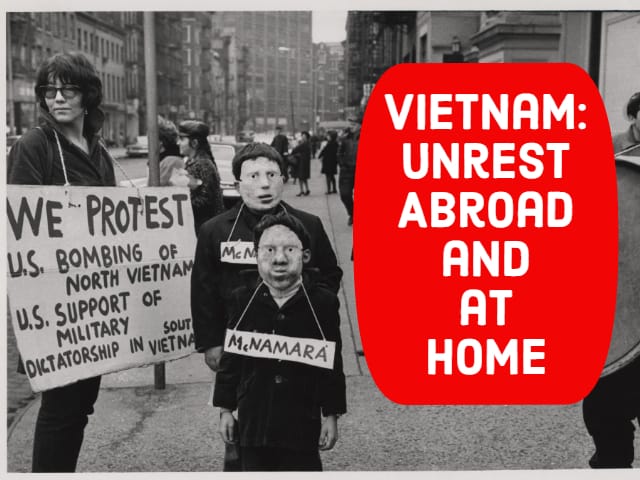Understanding the Lesson:
In today’s lesson, our class will read and source two primary documents to contextualize domestic unrest during, and in response to, the Vietnam War. Using these documents, students will answer the question:
“Why did many Americans oppose the Vietnam War?”
Students’ prior knowledge on the subject includes Cold War foreign policy (Containment), U.S. entry to the Vietnam War, and the Civil Rights movement of the mid-20th century. Following this lesson, students will be able to synthesize ideas from two primary documents to formulate a hypothesis for why many Americans opposed the Vietnam war.
Procedures:
To begin the lesson, I will raise the following questions to contextualize this lesson within the overall unit:
Why did the United States enter the Vietnam War? Where does this War fit in the context of the Cold War overall? And, What is happening in the U.S. during the early 1960s as the U.S. formally enters Vietnam?
As the students discuss the questions, I will hand out the Anti-Vietnam War Movement Timeline and Graphic Organizer. As discussion on the above questions continues, students will have time to complete the first question on the graphic organizer.
Next, students will open the attached documents on their device, printed copies made available for those who prefer them. As a class, students will read aloud the first document, followed by a short discussion. Students will fill in graphic organizer as they read. When done with the first document, we will have a brief discussion of their findings.
Click here – both documents in plain text format found here (citations below).
After this discussion, students will read the second document aloud as a class. After a brief discussion of this document, we will discuss the following questions further:
- Why did MLK and John Kerry oppose the war?
- Why did anti-war sentiment grow after 1968?
- Based on what you read, who opposed the war in Vietnam? Was it mostly college kids?
- Using all the documents, why did many Americans oppose the Vietnam War?
- Considering the context, can you speculate what those Americans who supported the war said?
Lastly, we will move on to formulate a final hypothesis of the initial question, “Why did many Americans oppose the Vietnam War?” To close, I will ask students to share their hypotheses, using the historical skills of source and context to support their answers.
Reflection:
I loved creating this lesson. In most of my own schooling experience, I learned history primarily from lectures and videos. After creating this lesson, I now see how learning through discovery offers a more meaningful, personal touch to history. Additionally, learning by this method helps students to develop critical thinking skills as opposed to passively “absorbing” information. The development of these skills alongside learning course content encourages a meaningful learning environment that will serve the students well for a lifetime. I am curious as to how I can find additional primary sources, including pictures, cartoons, letters, etc., to use in future classes.
I became more excited about history while creating this lesson, I hope the students pick up on some of that excitement as they work through the lesson as well.
Sources:
Lesson adapted from: SHEG
Document 1: Martin Luther King, Jr. “Beyond Vietnam,” April 4, 1967, Riverside Church in New York City. http://www.americanrhetoric.com/speeches/mlkatimetobreaksilence.htm
Document 2: John Kerry, testimony to the U.S. Senate Committee on Foreign Relations, April 23, 1971. http://www2.iath.virginia.edu/sixties/HTML_docs/Resources/Primary/Manifestos/VVAW_Kerry_Senate.html
Featured Image: Robert Joyce papers, 1952-1973, Flickr


I completely agree with your reflection, in which you say “learning by this method helps students to develop critical thinking skills as opposed to passively “absorbing” information.” I think you perfectly describe what we are all striving to do as history teachers. It is easy for students to just “remember” historic facts, but giving them the opportunities to critically think about history will allow it to resonate deeper within.
I like how this lesson is built around critical thinking rather than “passively absorbing information” as Nicole said. One of the biggest problems with teaching history, in my opinion, is that it relies very heavily on memorization of facts and dates rather than critical thinking skills that are used to ask questions and explore these facts and dates. I think this lesson is well build and allows for that critical thinking to happen